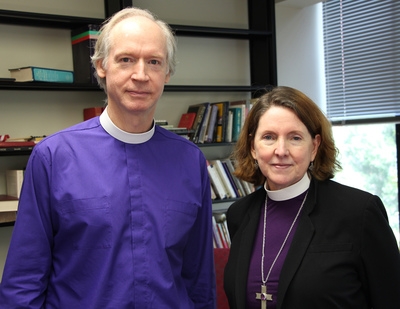Bishops of the Diocese of North Carolina Respond to Revocation of Protection Status for Salvadorans

By Diocesan House
The bishops of the Episcopal Diocese of North Carolina - the Rt. Rev. Sam Rodman, bishop, and the Rt. Rev. Anne Hodges-Copple, bishop suffragan - offer a statement in response to yesterday's announcement regarding the revocation of temporary protection status from Salvadorans:
On Monday, the Department of Homeland Security announced it is ending “temporary protection status” (TPS) for hundreds of thousands of Salvadoran citizens living in the United States, a protection offered in a time of trouble and extended for almost 20 years.
The TPS was offered to Salvadoran immigrants in the United States in 2001 following a series of earthquakes that left El Salvador, a country already dealing with high rates of violence and poverty, devastated. The protection allowed those who held it to remain in the U.S. legally, safe from deportment and eligible to obtain work visas. So those with the legal protection stayed, worked, payed taxes, and planted roots. With each government extension, those roots grew deeper: businesses were created, families started.
And now the government has revoked the protection as of September 2019, forcing everyone under its protection either to find another legal path to staying in the U.S. (a path the TPS did not make possible), or return to El Salvador.
The impact of this decision will be profound. Not just for those who held the legal TPS status; the hundreds of thousands of U.S.-citizen children born to these parents will either lose their parents to deportation or be forced from their own home country. Families in El Salvador will lose income crucial to survival as relatives working in the U.S. will no longer be able to help by sending money to relatives. Officials in El Salvador have already sounded the alarm that returning hundreds of thousands of deportees to a crippled economy will only deepen the unemployment problem, keeping more and more in poverty.
Unfortunately, Monday’s announcement was only the latest in a series of TPS revocations: the end of protection for Haitians, Nicaraguans and Sudanese were all announced in recent months. In 2018, decisions will be made about those from Honduras, Nepal, Somalia, Syria and Yemen.
The Episcopal Diocese of North Carolina has always been a supporter of immigrants and refugees and, especially in recent times, comprehensive immigration reform. We believe those who have found their way to the United States, especially through legal means or in seeking asylum, safety or a better way of life, should be welcome here. That the United States would grant protection to those fleeing war or devastation from natural disasters, extend that hospitality for decades, encourage the building of lives and families, only to revoke it with no thought to the consequences, is hard to comprehend.
As Christians, we have a biblical imperative to welcome the stranger; as we do it for “one of the least of these,” (Matthew 25:40) so we do it for our Lord and Savior, who himself was once forced to flee violence and seek refuge in a foreign land. The Episcopal Church took an official stand at the 78th General Convention, and we stand with them.
But we must do more. We must educate ourselves on the immigration policies in place and know how the discussions about them will affect those involved. Utilize the multitude of resources on the diocesan website. Ask questions. Contact your local, state and federal representatives; they represent you, so let them hear your voice.
Above all, pray. Pray for those facing this agonizing future of uncertainty. Pray for those who will be affected by the consequences of these decisions. Pray for lawmakers to review and revise immigration policies with wisdom and compassion. And pray for discernment about how we are called to act: to stand with the most vulnerable among us, to recognize in their faces the face of Christ, and to remember that each of us are beloved children of God and deserve to be treated as one of God’s own.
Yours faithfully,
The Rt. Rev. Sam Rodman
Bishop, Diocese of North Carolina
The Rt. Rev. Anne Hodges-Copple
Bishop Suffragan, Diocese of North Carolina
Tags: Immigration / Our Bishops
